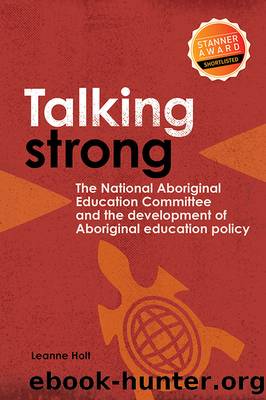Talking Strong by Leanne Holt

Author:Leanne, Holt [Leanne, Holt]
Language: eng
Format: epub
ISBN: 9781925302394
Publisher: Aboriginal Studies Press
Published: 2021-04-08T05:00:00+00:00
CHAPTER 7
Introducing Aboriginal and Torres Strait Islander studies: a change in education
We see the need for change in education for both Aboriginal and non-Aboriginal people, teachers and their children: to create an Australia where the values and cultures of both people thrive. (ACG 1975, p. 3)
Another primary focus of the second term of the NAEC was the appropriate application of Aboriginal studies2 across the curriculum at all levels of education and teacher training. Against a background of ignorance, ethnocentrism and racism, a Commonwealth Aboriginal Studies Working Group (CASWG) was established to oversee the introduction of Aboriginal studies content in schools. This group met with varying levels of success; however, it represented an important change in Aboriginal and Torres Strait Islander education.
Eleanor Bourke recalls the discussions and debates regarding the meaning of Aboriginal studies:
We were right into debating what Aboriginal studies meant and the distinction between Aboriginal studies meaning teaching other Australians about things Aboriginal and then the need for something different for Aboriginal people in terms of knowing certain things about culture, but not necessarily wanting to have the same curriculum as non-Aboriginal people had. So that entire sort of debate was going on. (Eleanor Bourke, interview, 2013)
Offering Aboriginal and Torres Strait Islander studies to all students was seen as generating knowledge of the values, practices and histories of Aboriginal and Torres Strait Islander peoples and developing a better understanding of the culture clash that challenged Aboriginal and Torres Strait Islander peoples. On the other hand, the education of Aboriginal and Torres Strait Islander students demonstrated consideration for their culture and identity as well as the values and experiences they brought from their communities. The work of the ACG had provided a foundation for this study; it had argued that the education of Aboriginal and Torres Strait Islander students should equally value an Aboriginal and Western viewpoint:
Aboriginal and Torres Strait Islander culture should be retained and . . . Aboriginal identity should be actively developed through education. It is accepted that some parts of Aboriginal culture and folklore associated with survival in pre-European times should now be replaced with those skills which will allow the Aboriginal people to participate equally in the trade and professional areas of the Australian economy . . . We are not prepared, however, to sacrifice social values such as responsibility for the well-being of others, sharing and non-destructive competition. These are a fundamental part of our identity. (ACG 1975, p. 4)
Throughout the 1980s, numerous national and state-led conferences and workshops, and research, focused on the implementation of Aboriginal studies in the education curriculum. In July 1980, the Australian Education Council, responsible for school curriculum, requested the establishment of the Commonwealth Aboriginal Studies Working Group. The terms of reference for the group were to âAscertain the extent and nature of Aboriginal studies programs in the States and Territoriesâ and to âIdentify areas of needâ (CASWG 1982, p. 1).
The CASWG (1982) reported that its establishment was recommended as a result of an NAEC discussion paper, âTeaching about Aboriginals and Torres Strait Islandersâ.
Download
This site does not store any files on its server. We only index and link to content provided by other sites. Please contact the content providers to delete copyright contents if any and email us, we'll remove relevant links or contents immediately.
Spare by Prince Harry The Duke of Sussex(5167)
Navigation and Map Reading by K Andrew(5145)
Tuesdays with Morrie by Mitch Albom(4756)
Machine Learning at Scale with H2O by Gregory Keys | David Whiting(4284)
Cracking the GRE Premium Edition with 6 Practice Tests, 2015 (Graduate School Test Preparation) by Princeton Review(4266)
Never by Ken Follett(3922)
Goodbye Paradise(3793)
What It Really Takes to Get Into Ivy League and Other Highly Selective Colleges by Hughes Chuck(3734)
Fairy Tale by Stephen King(3358)
Harry Potter and the Prisoner of Azkaban (Book 3) by J. K. Rowling(3341)
Pledged by Alexandra Robbins(3167)
Kick Ass in College: Highest Rated "How to Study in College" Book | 77 Ninja Study Skills Tips and Career Strategies | Motivational for College Students: A Guerrilla Guide to College Success by Fox Gunnar(3107)
Reminders of Him: A Novel by Colleen Hoover(3065)
A Dictionary of Sociology by Unknown(3059)
Sapiens and Homo Deus by Yuval Noah Harari(3054)
The Social Psychology of Inequality by Unknown(3011)
Graduate Admissions Essays, Fourth Edition: Write Your Way into the Graduate School of Your Choice (Graduate Admissions Essays: Write Your Way Into the) by Asher Donald(2900)
Will by Will Smith(2892)
Zero to Make by David Lang(2772)
